NURS2098: Recovery Focused Nursing Care Plan - Marie Case
VerifiedAdded on 2023/04/20
|10
|2728
|143
Report
AI Summary
This assignment provides a recovery-focused mental health care plan centered around a case study of Marie, a 31-year-old woman experiencing postpartum depression. The care plan identifies three priority goals/issues: Marie's loss of self and depression, her guilt related to breastfeeding and inability to perform daily activities, and her unhealthy eating habits and low appetite. For each issue, the plan outlines Marie's strengths, consumer and nursing interventions, responsible parties, and a timeframe for achieving the goals. The interventions focus on empowering Marie, improving her self-confidence, fostering social connections, and promoting healthy eating and exercise habits. The plan emphasizes a collaborative approach involving Marie, her family, case manager, and other healthcare professionals to support her recovery and well-being. Desklib offers a wealth of resources, including similar solved assignments and past papers, to aid students in their studies.
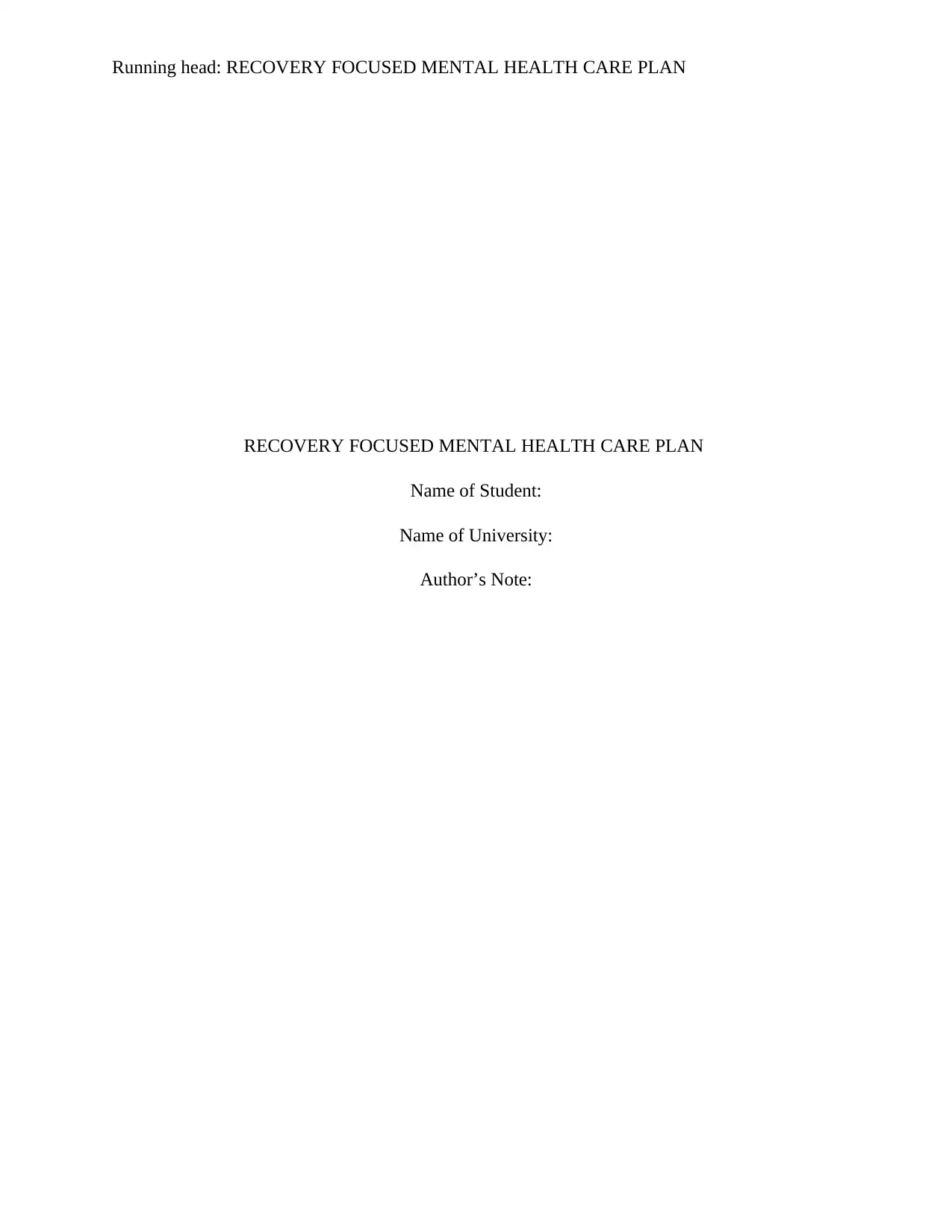
Running head: RECOVERY FOCUSED MENTAL HEALTH CARE PLAN
RECOVERY FOCUSED MENTAL HEALTH CARE PLAN
Name of Student:
Name of University:
Author’s Note:
RECOVERY FOCUSED MENTAL HEALTH CARE PLAN
Name of Student:
Name of University:
Author’s Note:
Paraphrase This Document
Need a fresh take? Get an instant paraphrase of this document with our AI Paraphraser
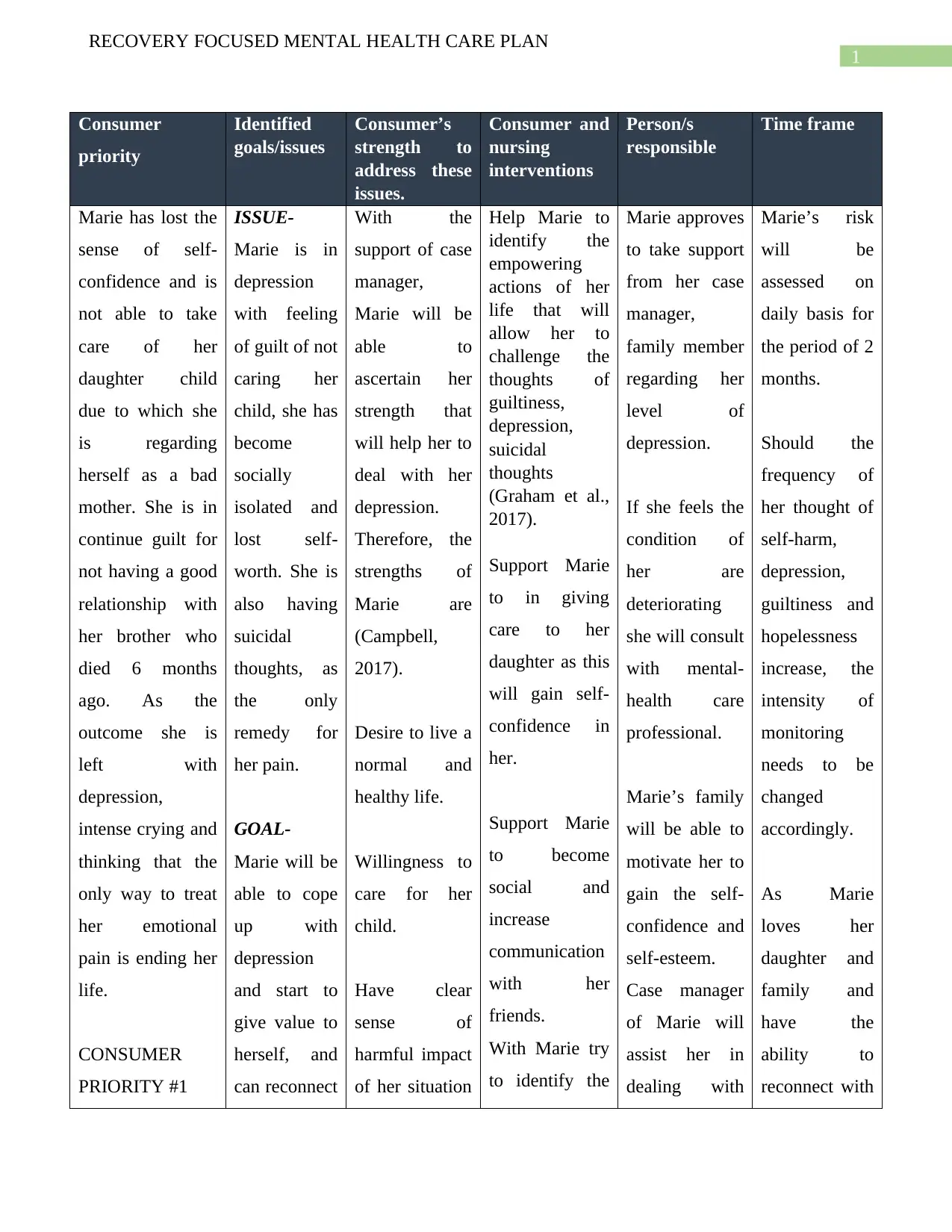
1
RECOVERY FOCUSED MENTAL HEALTH CARE PLAN
Consumer
priority
Identified
goals/issues
Consumer’s
strength to
address these
issues.
Consumer and
nursing
interventions
Person/s
responsible
Time frame
Marie has lost the
sense of self-
confidence and is
not able to take
care of her
daughter child
due to which she
is regarding
herself as a bad
mother. She is in
continue guilt for
not having a good
relationship with
her brother who
died 6 months
ago. As the
outcome she is
left with
depression,
intense crying and
thinking that the
only way to treat
her emotional
pain is ending her
life.
CONSUMER
PRIORITY #1
ISSUE-
Marie is in
depression
with feeling
of guilt of not
caring her
child, she has
become
socially
isolated and
lost self-
worth. She is
also having
suicidal
thoughts, as
the only
remedy for
her pain.
GOAL-
Marie will be
able to cope
up with
depression
and start to
give value to
herself, and
can reconnect
With the
support of case
manager,
Marie will be
able to
ascertain her
strength that
will help her to
deal with her
depression.
Therefore, the
strengths of
Marie are
(Campbell,
2017).
Desire to live a
normal and
healthy life.
Willingness to
care for her
child.
Have clear
sense of
harmful impact
of her situation
Help Marie to
identify the
empowering
actions of her
life that will
allow her to
challenge the
thoughts of
guiltiness,
depression,
suicidal
thoughts
(Graham et al.,
2017).
Support Marie
to in giving
care to her
daughter as this
will gain self-
confidence in
her.
Support Marie
to become
social and
increase
communication
with her
friends.
With Marie try
to identify the
Marie approves
to take support
from her case
manager,
family member
regarding her
level of
depression.
If she feels the
condition of
her are
deteriorating
she will consult
with mental-
health care
professional.
Marie’s family
will be able to
motivate her to
gain the self-
confidence and
self-esteem.
Case manager
of Marie will
assist her in
dealing with
Marie’s risk
will be
assessed on
daily basis for
the period of 2
months.
Should the
frequency of
her thought of
self-harm,
depression,
guiltiness and
hopelessness
increase, the
intensity of
monitoring
needs to be
changed
accordingly.
As Marie
loves her
daughter and
family and
have the
ability to
reconnect with
RECOVERY FOCUSED MENTAL HEALTH CARE PLAN
Consumer
priority
Identified
goals/issues
Consumer’s
strength to
address these
issues.
Consumer and
nursing
interventions
Person/s
responsible
Time frame
Marie has lost the
sense of self-
confidence and is
not able to take
care of her
daughter child
due to which she
is regarding
herself as a bad
mother. She is in
continue guilt for
not having a good
relationship with
her brother who
died 6 months
ago. As the
outcome she is
left with
depression,
intense crying and
thinking that the
only way to treat
her emotional
pain is ending her
life.
CONSUMER
PRIORITY #1
ISSUE-
Marie is in
depression
with feeling
of guilt of not
caring her
child, she has
become
socially
isolated and
lost self-
worth. She is
also having
suicidal
thoughts, as
the only
remedy for
her pain.
GOAL-
Marie will be
able to cope
up with
depression
and start to
give value to
herself, and
can reconnect
With the
support of case
manager,
Marie will be
able to
ascertain her
strength that
will help her to
deal with her
depression.
Therefore, the
strengths of
Marie are
(Campbell,
2017).
Desire to live a
normal and
healthy life.
Willingness to
care for her
child.
Have clear
sense of
harmful impact
of her situation
Help Marie to
identify the
empowering
actions of her
life that will
allow her to
challenge the
thoughts of
guiltiness,
depression,
suicidal
thoughts
(Graham et al.,
2017).
Support Marie
to in giving
care to her
daughter as this
will gain self-
confidence in
her.
Support Marie
to become
social and
increase
communication
with her
friends.
With Marie try
to identify the
Marie approves
to take support
from her case
manager,
family member
regarding her
level of
depression.
If she feels the
condition of
her are
deteriorating
she will consult
with mental-
health care
professional.
Marie’s family
will be able to
motivate her to
gain the self-
confidence and
self-esteem.
Case manager
of Marie will
assist her in
dealing with
Marie’s risk
will be
assessed on
daily basis for
the period of 2
months.
Should the
frequency of
her thought of
self-harm,
depression,
guiltiness and
hopelessness
increase, the
intensity of
monitoring
needs to be
changed
accordingly.
As Marie
loves her
daughter and
family and
have the
ability to
reconnect with
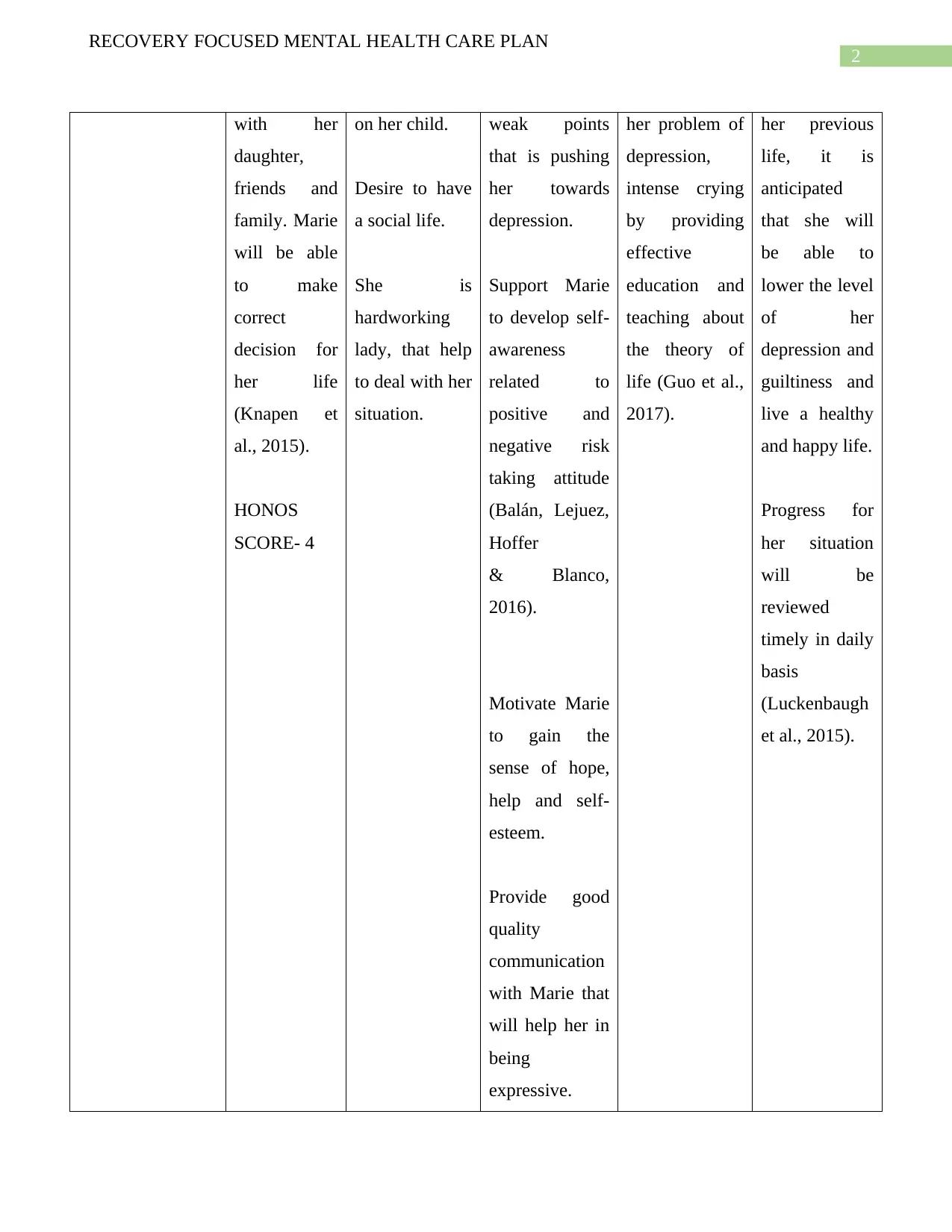
2
RECOVERY FOCUSED MENTAL HEALTH CARE PLAN
with her
daughter,
friends and
family. Marie
will be able
to make
correct
decision for
her life
(Knapen et
al., 2015).
HONOS
SCORE- 4
on her child.
Desire to have
a social life.
She is
hardworking
lady, that help
to deal with her
situation.
weak points
that is pushing
her towards
depression.
Support Marie
to develop self-
awareness
related to
positive and
negative risk
taking attitude
(Balán, Lejuez,
Hoffer
& Blanco,
2016).
Motivate Marie
to gain the
sense of hope,
help and self-
esteem.
Provide good
quality
communication
with Marie that
will help her in
being
expressive.
her problem of
depression,
intense crying
by providing
effective
education and
teaching about
the theory of
life (Guo et al.,
2017).
her previous
life, it is
anticipated
that she will
be able to
lower the level
of her
depression and
guiltiness and
live a healthy
and happy life.
Progress for
her situation
will be
reviewed
timely in daily
basis
(Luckenbaugh
et al., 2015).
RECOVERY FOCUSED MENTAL HEALTH CARE PLAN
with her
daughter,
friends and
family. Marie
will be able
to make
correct
decision for
her life
(Knapen et
al., 2015).
HONOS
SCORE- 4
on her child.
Desire to have
a social life.
She is
hardworking
lady, that help
to deal with her
situation.
weak points
that is pushing
her towards
depression.
Support Marie
to develop self-
awareness
related to
positive and
negative risk
taking attitude
(Balán, Lejuez,
Hoffer
& Blanco,
2016).
Motivate Marie
to gain the
sense of hope,
help and self-
esteem.
Provide good
quality
communication
with Marie that
will help her in
being
expressive.
her problem of
depression,
intense crying
by providing
effective
education and
teaching about
the theory of
life (Guo et al.,
2017).
her previous
life, it is
anticipated
that she will
be able to
lower the level
of her
depression and
guiltiness and
live a healthy
and happy life.
Progress for
her situation
will be
reviewed
timely in daily
basis
(Luckenbaugh
et al., 2015).
⊘ This is a preview!⊘
Do you want full access?
Subscribe today to unlock all pages.

Trusted by 1+ million students worldwide
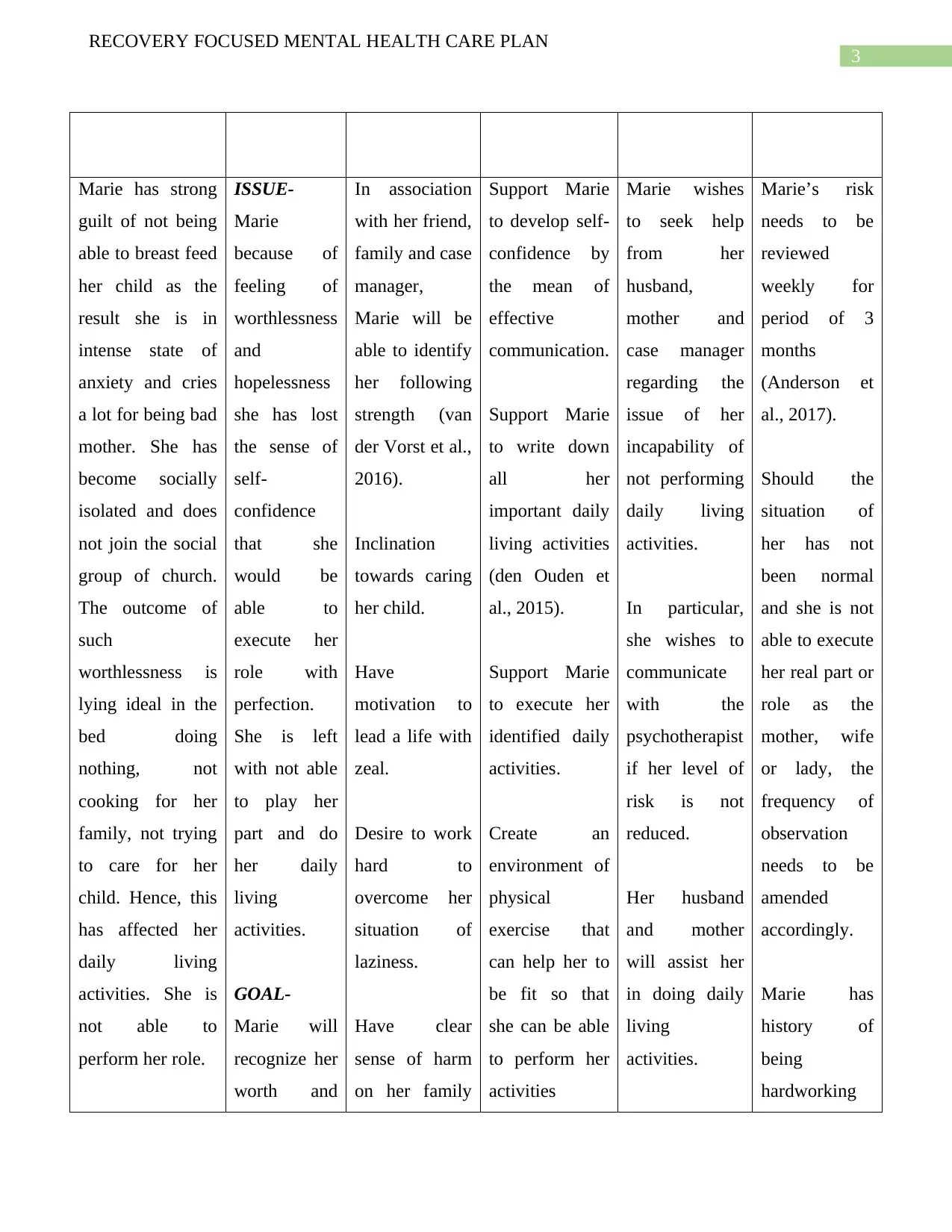
3
RECOVERY FOCUSED MENTAL HEALTH CARE PLAN
Marie has strong
guilt of not being
able to breast feed
her child as the
result she is in
intense state of
anxiety and cries
a lot for being bad
mother. She has
become socially
isolated and does
not join the social
group of church.
The outcome of
such
worthlessness is
lying ideal in the
bed doing
nothing, not
cooking for her
family, not trying
to care for her
child. Hence, this
has affected her
daily living
activities. She is
not able to
perform her role.
ISSUE-
Marie
because of
feeling of
worthlessness
and
hopelessness
she has lost
the sense of
self-
confidence
that she
would be
able to
execute her
role with
perfection.
She is left
with not able
to play her
part and do
her daily
living
activities.
GOAL-
Marie will
recognize her
worth and
In association
with her friend,
family and case
manager,
Marie will be
able to identify
her following
strength (van
der Vorst et al.,
2016).
Inclination
towards caring
her child.
Have
motivation to
lead a life with
zeal.
Desire to work
hard to
overcome her
situation of
laziness.
Have clear
sense of harm
on her family
Support Marie
to develop self-
confidence by
the mean of
effective
communication.
Support Marie
to write down
all her
important daily
living activities
(den Ouden et
al., 2015).
Support Marie
to execute her
identified daily
activities.
Create an
environment of
physical
exercise that
can help her to
be fit so that
she can be able
to perform her
activities
Marie wishes
to seek help
from her
husband,
mother and
case manager
regarding the
issue of her
incapability of
not performing
daily living
activities.
In particular,
she wishes to
communicate
with the
psychotherapist
if her level of
risk is not
reduced.
Her husband
and mother
will assist her
in doing daily
living
activities.
Marie’s risk
needs to be
reviewed
weekly for
period of 3
months
(Anderson et
al., 2017).
Should the
situation of
her has not
been normal
and she is not
able to execute
her real part or
role as the
mother, wife
or lady, the
frequency of
observation
needs to be
amended
accordingly.
Marie has
history of
being
hardworking
RECOVERY FOCUSED MENTAL HEALTH CARE PLAN
Marie has strong
guilt of not being
able to breast feed
her child as the
result she is in
intense state of
anxiety and cries
a lot for being bad
mother. She has
become socially
isolated and does
not join the social
group of church.
The outcome of
such
worthlessness is
lying ideal in the
bed doing
nothing, not
cooking for her
family, not trying
to care for her
child. Hence, this
has affected her
daily living
activities. She is
not able to
perform her role.
ISSUE-
Marie
because of
feeling of
worthlessness
and
hopelessness
she has lost
the sense of
self-
confidence
that she
would be
able to
execute her
role with
perfection.
She is left
with not able
to play her
part and do
her daily
living
activities.
GOAL-
Marie will
recognize her
worth and
In association
with her friend,
family and case
manager,
Marie will be
able to identify
her following
strength (van
der Vorst et al.,
2016).
Inclination
towards caring
her child.
Have
motivation to
lead a life with
zeal.
Desire to work
hard to
overcome her
situation of
laziness.
Have clear
sense of harm
on her family
Support Marie
to develop self-
confidence by
the mean of
effective
communication.
Support Marie
to write down
all her
important daily
living activities
(den Ouden et
al., 2015).
Support Marie
to execute her
identified daily
activities.
Create an
environment of
physical
exercise that
can help her to
be fit so that
she can be able
to perform her
activities
Marie wishes
to seek help
from her
husband,
mother and
case manager
regarding the
issue of her
incapability of
not performing
daily living
activities.
In particular,
she wishes to
communicate
with the
psychotherapist
if her level of
risk is not
reduced.
Her husband
and mother
will assist her
in doing daily
living
activities.
Marie’s risk
needs to be
reviewed
weekly for
period of 3
months
(Anderson et
al., 2017).
Should the
situation of
her has not
been normal
and she is not
able to execute
her real part or
role as the
mother, wife
or lady, the
frequency of
observation
needs to be
amended
accordingly.
Marie has
history of
being
hardworking
Paraphrase This Document
Need a fresh take? Get an instant paraphrase of this document with our AI Paraphraser
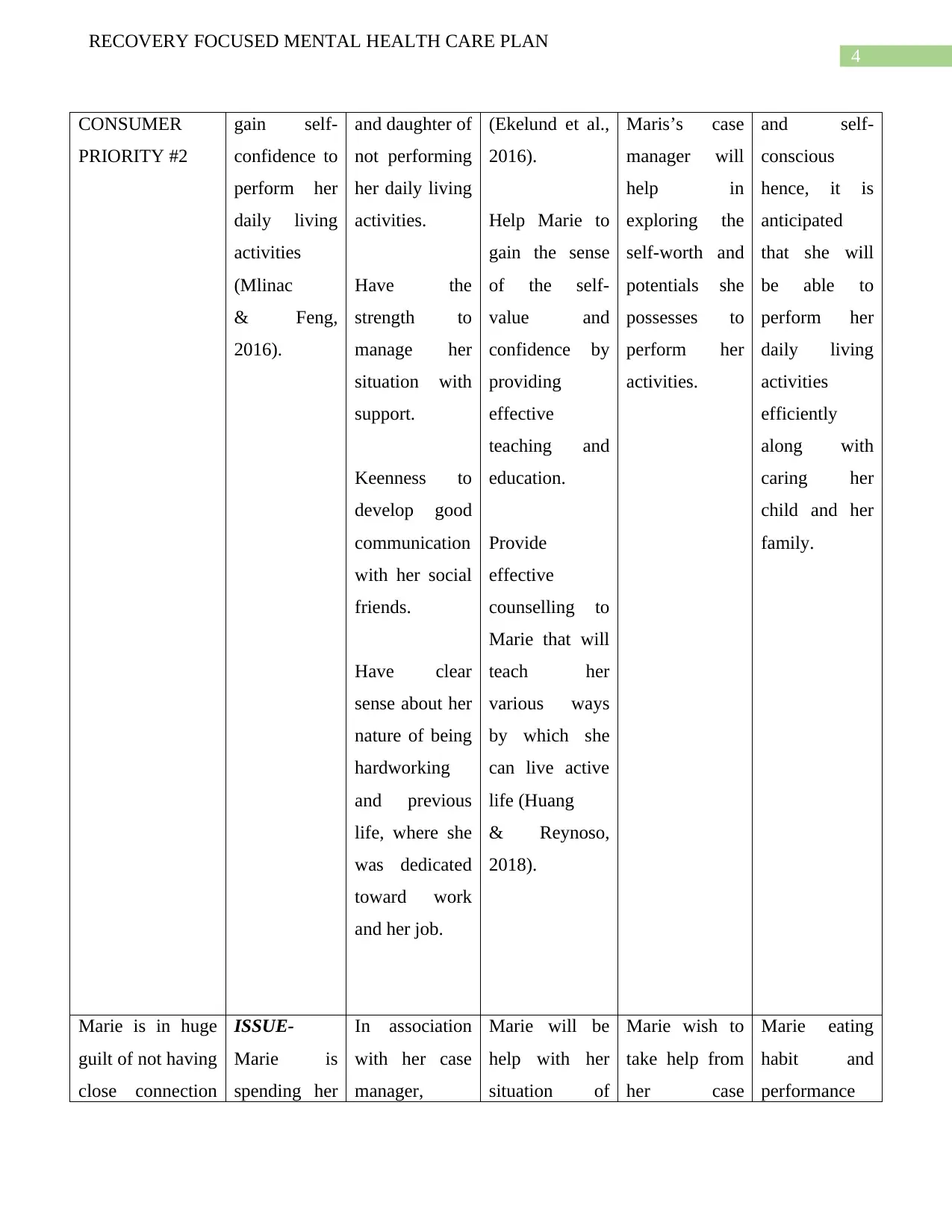
4
RECOVERY FOCUSED MENTAL HEALTH CARE PLAN
CONSUMER
PRIORITY #2
gain self-
confidence to
perform her
daily living
activities
(Mlinac
& Feng,
2016).
and daughter of
not performing
her daily living
activities.
Have the
strength to
manage her
situation with
support.
Keenness to
develop good
communication
with her social
friends.
Have clear
sense about her
nature of being
hardworking
and previous
life, where she
was dedicated
toward work
and her job.
(Ekelund et al.,
2016).
Help Marie to
gain the sense
of the self-
value and
confidence by
providing
effective
teaching and
education.
Provide
effective
counselling to
Marie that will
teach her
various ways
by which she
can live active
life (Huang
& Reynoso,
2018).
Maris’s case
manager will
help in
exploring the
self-worth and
potentials she
possesses to
perform her
activities.
and self-
conscious
hence, it is
anticipated
that she will
be able to
perform her
daily living
activities
efficiently
along with
caring her
child and her
family.
Marie is in huge
guilt of not having
close connection
ISSUE-
Marie is
spending her
In association
with her case
manager,
Marie will be
help with her
situation of
Marie wish to
take help from
her case
Marie eating
habit and
performance
RECOVERY FOCUSED MENTAL HEALTH CARE PLAN
CONSUMER
PRIORITY #2
gain self-
confidence to
perform her
daily living
activities
(Mlinac
& Feng,
2016).
and daughter of
not performing
her daily living
activities.
Have the
strength to
manage her
situation with
support.
Keenness to
develop good
communication
with her social
friends.
Have clear
sense about her
nature of being
hardworking
and previous
life, where she
was dedicated
toward work
and her job.
(Ekelund et al.,
2016).
Help Marie to
gain the sense
of the self-
value and
confidence by
providing
effective
teaching and
education.
Provide
effective
counselling to
Marie that will
teach her
various ways
by which she
can live active
life (Huang
& Reynoso,
2018).
Maris’s case
manager will
help in
exploring the
self-worth and
potentials she
possesses to
perform her
activities.
and self-
conscious
hence, it is
anticipated
that she will
be able to
perform her
daily living
activities
efficiently
along with
caring her
child and her
family.
Marie is in huge
guilt of not having
close connection
ISSUE-
Marie is
spending her
In association
with her case
manager,
Marie will be
help with her
situation of
Marie wish to
take help from
her case
Marie eating
habit and
performance
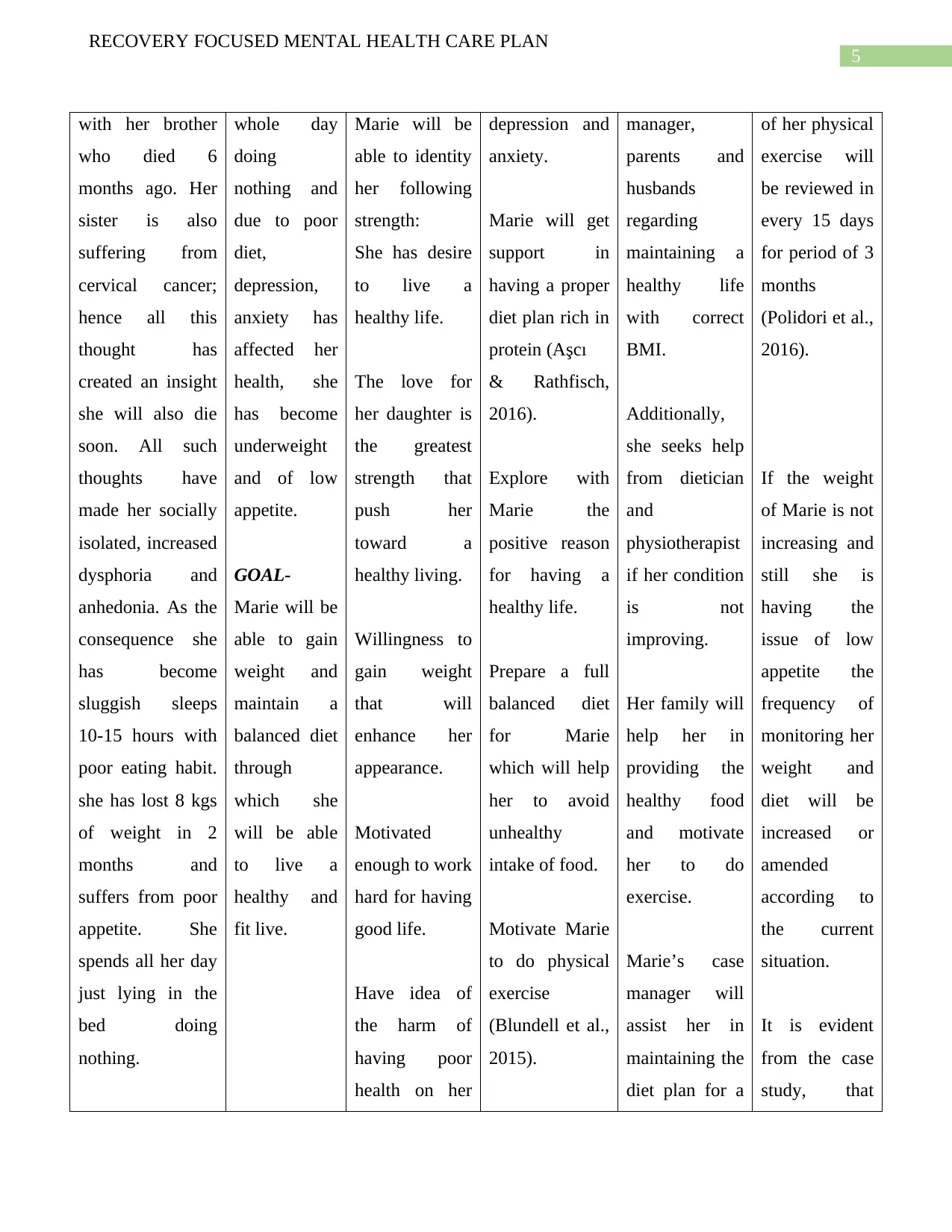
5
RECOVERY FOCUSED MENTAL HEALTH CARE PLAN
with her brother
who died 6
months ago. Her
sister is also
suffering from
cervical cancer;
hence all this
thought has
created an insight
she will also die
soon. All such
thoughts have
made her socially
isolated, increased
dysphoria and
anhedonia. As the
consequence she
has become
sluggish sleeps
10-15 hours with
poor eating habit.
she has lost 8 kgs
of weight in 2
months and
suffers from poor
appetite. She
spends all her day
just lying in the
bed doing
nothing.
whole day
doing
nothing and
due to poor
diet,
depression,
anxiety has
affected her
health, she
has become
underweight
and of low
appetite.
GOAL-
Marie will be
able to gain
weight and
maintain a
balanced diet
through
which she
will be able
to live a
healthy and
fit live.
Marie will be
able to identity
her following
strength:
She has desire
to live a
healthy life.
The love for
her daughter is
the greatest
strength that
push her
toward a
healthy living.
Willingness to
gain weight
that will
enhance her
appearance.
Motivated
enough to work
hard for having
good life.
Have idea of
the harm of
having poor
health on her
depression and
anxiety.
Marie will get
support in
having a proper
diet plan rich in
protein (Aşcı
& Rathfisch,
2016).
Explore with
Marie the
positive reason
for having a
healthy life.
Prepare a full
balanced diet
for Marie
which will help
her to avoid
unhealthy
intake of food.
Motivate Marie
to do physical
exercise
(Blundell et al.,
2015).
manager,
parents and
husbands
regarding
maintaining a
healthy life
with correct
BMI.
Additionally,
she seeks help
from dietician
and
physiotherapist
if her condition
is not
improving.
Her family will
help her in
providing the
healthy food
and motivate
her to do
exercise.
Marie’s case
manager will
assist her in
maintaining the
diet plan for a
of her physical
exercise will
be reviewed in
every 15 days
for period of 3
months
(Polidori et al.,
2016).
If the weight
of Marie is not
increasing and
still she is
having the
issue of low
appetite the
frequency of
monitoring her
weight and
diet will be
increased or
amended
according to
the current
situation.
It is evident
from the case
study, that
RECOVERY FOCUSED MENTAL HEALTH CARE PLAN
with her brother
who died 6
months ago. Her
sister is also
suffering from
cervical cancer;
hence all this
thought has
created an insight
she will also die
soon. All such
thoughts have
made her socially
isolated, increased
dysphoria and
anhedonia. As the
consequence she
has become
sluggish sleeps
10-15 hours with
poor eating habit.
she has lost 8 kgs
of weight in 2
months and
suffers from poor
appetite. She
spends all her day
just lying in the
bed doing
nothing.
whole day
doing
nothing and
due to poor
diet,
depression,
anxiety has
affected her
health, she
has become
underweight
and of low
appetite.
GOAL-
Marie will be
able to gain
weight and
maintain a
balanced diet
through
which she
will be able
to live a
healthy and
fit live.
Marie will be
able to identity
her following
strength:
She has desire
to live a
healthy life.
The love for
her daughter is
the greatest
strength that
push her
toward a
healthy living.
Willingness to
gain weight
that will
enhance her
appearance.
Motivated
enough to work
hard for having
good life.
Have idea of
the harm of
having poor
health on her
depression and
anxiety.
Marie will get
support in
having a proper
diet plan rich in
protein (Aşcı
& Rathfisch,
2016).
Explore with
Marie the
positive reason
for having a
healthy life.
Prepare a full
balanced diet
for Marie
which will help
her to avoid
unhealthy
intake of food.
Motivate Marie
to do physical
exercise
(Blundell et al.,
2015).
manager,
parents and
husbands
regarding
maintaining a
healthy life
with correct
BMI.
Additionally,
she seeks help
from dietician
and
physiotherapist
if her condition
is not
improving.
Her family will
help her in
providing the
healthy food
and motivate
her to do
exercise.
Marie’s case
manager will
assist her in
maintaining the
diet plan for a
of her physical
exercise will
be reviewed in
every 15 days
for period of 3
months
(Polidori et al.,
2016).
If the weight
of Marie is not
increasing and
still she is
having the
issue of low
appetite the
frequency of
monitoring her
weight and
diet will be
increased or
amended
according to
the current
situation.
It is evident
from the case
study, that
⊘ This is a preview!⊘
Do you want full access?
Subscribe today to unlock all pages.

Trusted by 1+ million students worldwide
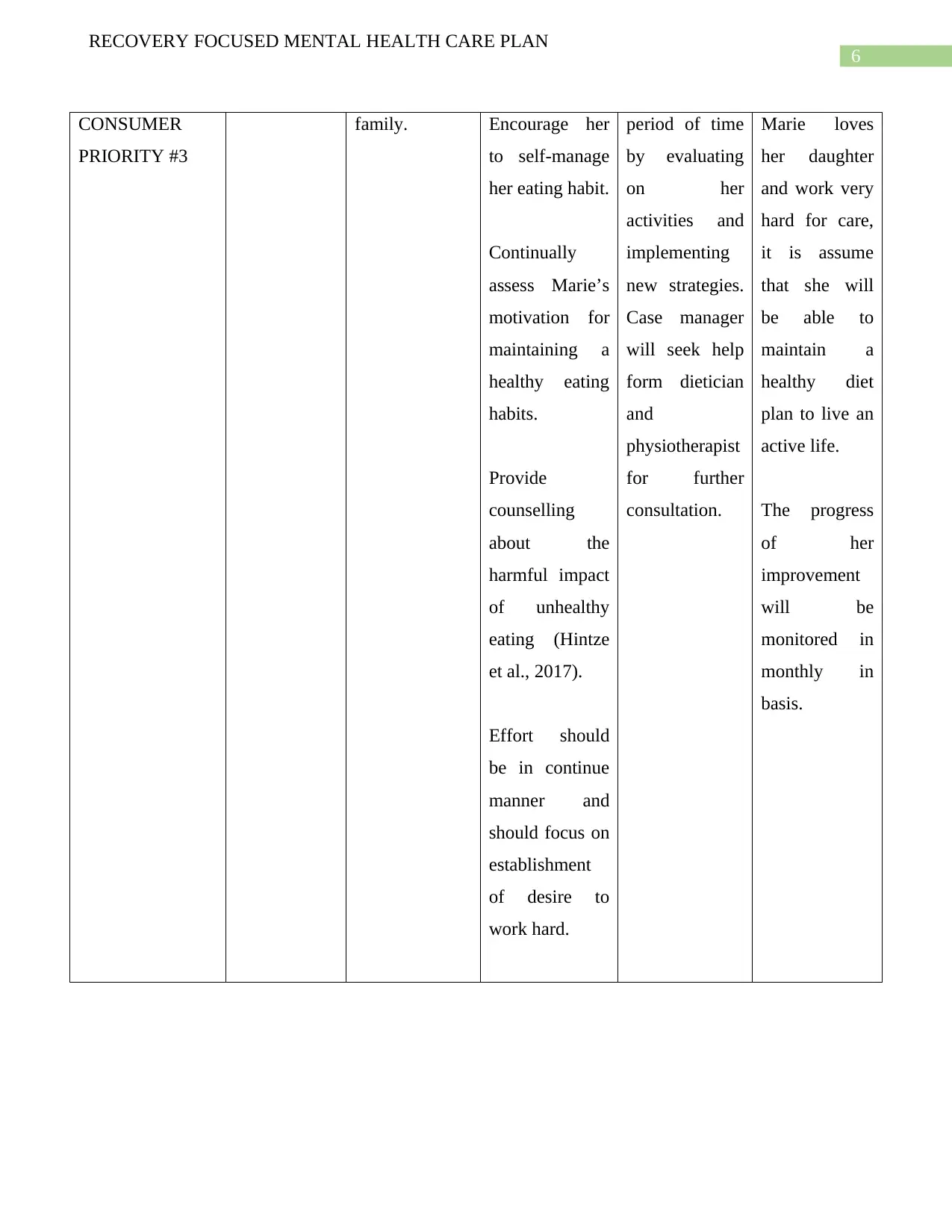
6
RECOVERY FOCUSED MENTAL HEALTH CARE PLAN
CONSUMER
PRIORITY #3
family. Encourage her
to self-manage
her eating habit.
Continually
assess Marie’s
motivation for
maintaining a
healthy eating
habits.
Provide
counselling
about the
harmful impact
of unhealthy
eating (Hintze
et al., 2017).
Effort should
be in continue
manner and
should focus on
establishment
of desire to
work hard.
period of time
by evaluating
on her
activities and
implementing
new strategies.
Case manager
will seek help
form dietician
and
physiotherapist
for further
consultation.
Marie loves
her daughter
and work very
hard for care,
it is assume
that she will
be able to
maintain a
healthy diet
plan to live an
active life.
The progress
of her
improvement
will be
monitored in
monthly in
basis.
RECOVERY FOCUSED MENTAL HEALTH CARE PLAN
CONSUMER
PRIORITY #3
family. Encourage her
to self-manage
her eating habit.
Continually
assess Marie’s
motivation for
maintaining a
healthy eating
habits.
Provide
counselling
about the
harmful impact
of unhealthy
eating (Hintze
et al., 2017).
Effort should
be in continue
manner and
should focus on
establishment
of desire to
work hard.
period of time
by evaluating
on her
activities and
implementing
new strategies.
Case manager
will seek help
form dietician
and
physiotherapist
for further
consultation.
Marie loves
her daughter
and work very
hard for care,
it is assume
that she will
be able to
maintain a
healthy diet
plan to live an
active life.
The progress
of her
improvement
will be
monitored in
monthly in
basis.
Paraphrase This Document
Need a fresh take? Get an instant paraphrase of this document with our AI Paraphraser
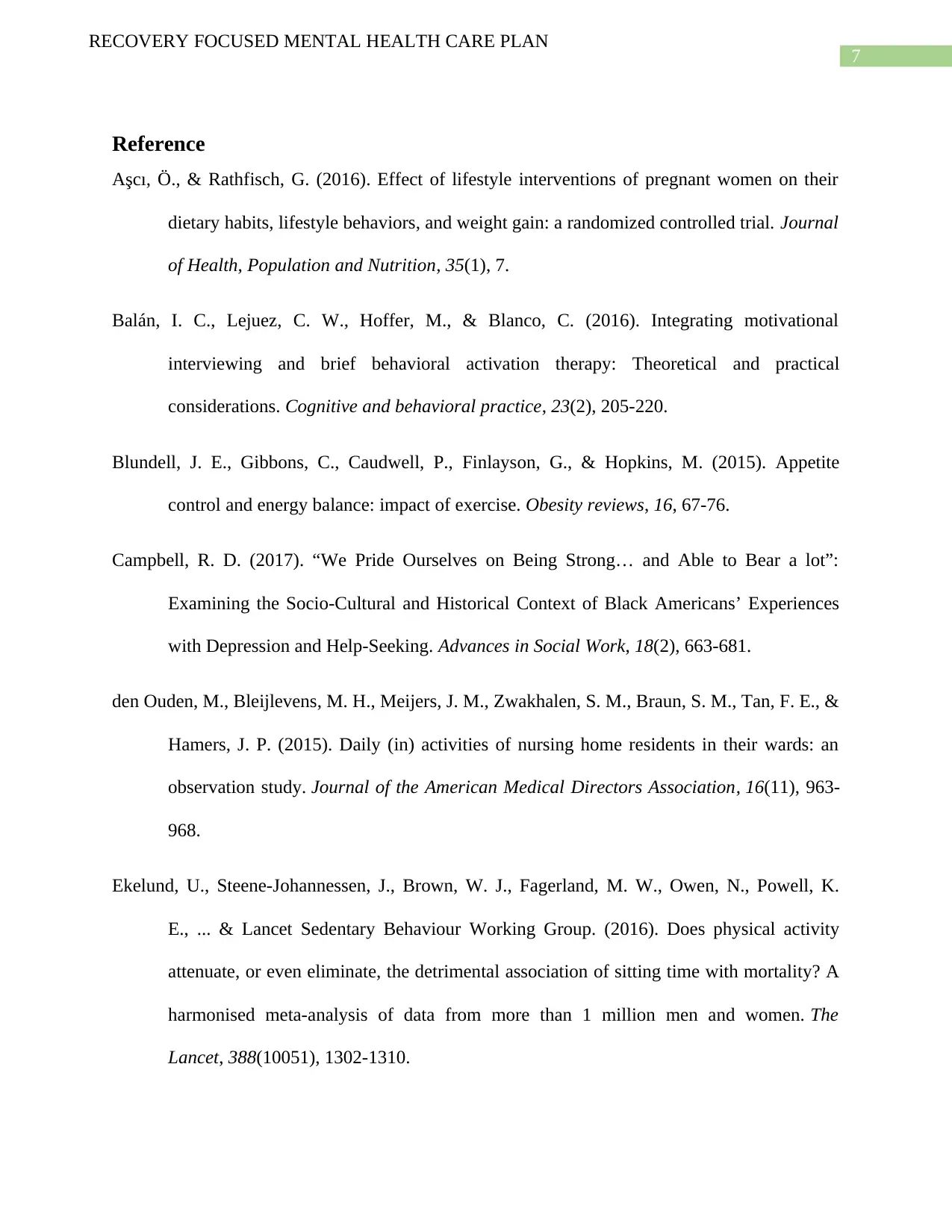
7
RECOVERY FOCUSED MENTAL HEALTH CARE PLAN
Reference
Aşcı, Ö., & Rathfisch, G. (2016). Effect of lifestyle interventions of pregnant women on their
dietary habits, lifestyle behaviors, and weight gain: a randomized controlled trial. Journal
of Health, Population and Nutrition, 35(1), 7.
Balán, I. C., Lejuez, C. W., Hoffer, M., & Blanco, C. (2016). Integrating motivational
interviewing and brief behavioral activation therapy: Theoretical and practical
considerations. Cognitive and behavioral practice, 23(2), 205-220.
Blundell, J. E., Gibbons, C., Caudwell, P., Finlayson, G., & Hopkins, M. (2015). Appetite
control and energy balance: impact of exercise. Obesity reviews, 16, 67-76.
Campbell, R. D. (2017). “We Pride Ourselves on Being Strong… and Able to Bear a lot”:
Examining the Socio-Cultural and Historical Context of Black Americans’ Experiences
with Depression and Help-Seeking. Advances in Social Work, 18(2), 663-681.
den Ouden, M., Bleijlevens, M. H., Meijers, J. M., Zwakhalen, S. M., Braun, S. M., Tan, F. E., &
Hamers, J. P. (2015). Daily (in) activities of nursing home residents in their wards: an
observation study. Journal of the American Medical Directors Association, 16(11), 963-
968.
Ekelund, U., Steene-Johannessen, J., Brown, W. J., Fagerland, M. W., Owen, N., Powell, K.
E., ... & Lancet Sedentary Behaviour Working Group. (2016). Does physical activity
attenuate, or even eliminate, the detrimental association of sitting time with mortality? A
harmonised meta-analysis of data from more than 1 million men and women. The
Lancet, 388(10051), 1302-1310.
RECOVERY FOCUSED MENTAL HEALTH CARE PLAN
Reference
Aşcı, Ö., & Rathfisch, G. (2016). Effect of lifestyle interventions of pregnant women on their
dietary habits, lifestyle behaviors, and weight gain: a randomized controlled trial. Journal
of Health, Population and Nutrition, 35(1), 7.
Balán, I. C., Lejuez, C. W., Hoffer, M., & Blanco, C. (2016). Integrating motivational
interviewing and brief behavioral activation therapy: Theoretical and practical
considerations. Cognitive and behavioral practice, 23(2), 205-220.
Blundell, J. E., Gibbons, C., Caudwell, P., Finlayson, G., & Hopkins, M. (2015). Appetite
control and energy balance: impact of exercise. Obesity reviews, 16, 67-76.
Campbell, R. D. (2017). “We Pride Ourselves on Being Strong… and Able to Bear a lot”:
Examining the Socio-Cultural and Historical Context of Black Americans’ Experiences
with Depression and Help-Seeking. Advances in Social Work, 18(2), 663-681.
den Ouden, M., Bleijlevens, M. H., Meijers, J. M., Zwakhalen, S. M., Braun, S. M., Tan, F. E., &
Hamers, J. P. (2015). Daily (in) activities of nursing home residents in their wards: an
observation study. Journal of the American Medical Directors Association, 16(11), 963-
968.
Ekelund, U., Steene-Johannessen, J., Brown, W. J., Fagerland, M. W., Owen, N., Powell, K.
E., ... & Lancet Sedentary Behaviour Working Group. (2016). Does physical activity
attenuate, or even eliminate, the detrimental association of sitting time with mortality? A
harmonised meta-analysis of data from more than 1 million men and women. The
Lancet, 388(10051), 1302-1310.
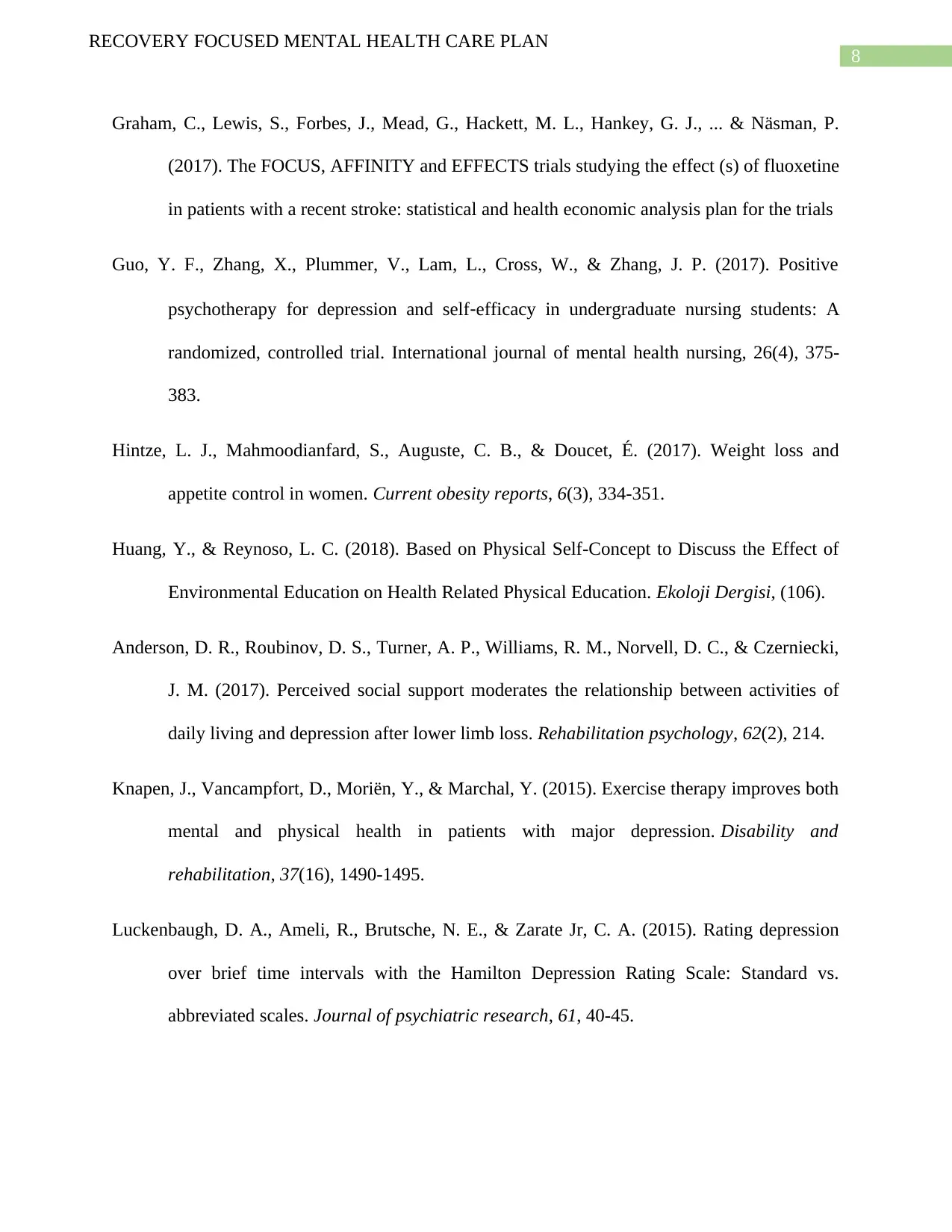
8
RECOVERY FOCUSED MENTAL HEALTH CARE PLAN
Graham, C., Lewis, S., Forbes, J., Mead, G., Hackett, M. L., Hankey, G. J., ... & Näsman, P.
(2017). The FOCUS, AFFINITY and EFFECTS trials studying the effect (s) of fluoxetine
in patients with a recent stroke: statistical and health economic analysis plan for the trials
Guo, Y. F., Zhang, X., Plummer, V., Lam, L., Cross, W., & Zhang, J. P. (2017). Positive
psychotherapy for depression and self‐efficacy in undergraduate nursing students: A
randomized, controlled trial. International journal of mental health nursing, 26(4), 375-
383.
Hintze, L. J., Mahmoodianfard, S., Auguste, C. B., & Doucet, É. (2017). Weight loss and
appetite control in women. Current obesity reports, 6(3), 334-351.
Huang, Y., & Reynoso, L. C. (2018). Based on Physical Self-Concept to Discuss the Effect of
Environmental Education on Health Related Physical Education. Ekoloji Dergisi, (106).
Anderson, D. R., Roubinov, D. S., Turner, A. P., Williams, R. M., Norvell, D. C., & Czerniecki,
J. M. (2017). Perceived social support moderates the relationship between activities of
daily living and depression after lower limb loss. Rehabilitation psychology, 62(2), 214.
Knapen, J., Vancampfort, D., Moriën, Y., & Marchal, Y. (2015). Exercise therapy improves both
mental and physical health in patients with major depression. Disability and
rehabilitation, 37(16), 1490-1495.
Luckenbaugh, D. A., Ameli, R., Brutsche, N. E., & Zarate Jr, C. A. (2015). Rating depression
over brief time intervals with the Hamilton Depression Rating Scale: Standard vs.
abbreviated scales. Journal of psychiatric research, 61, 40-45.
RECOVERY FOCUSED MENTAL HEALTH CARE PLAN
Graham, C., Lewis, S., Forbes, J., Mead, G., Hackett, M. L., Hankey, G. J., ... & Näsman, P.
(2017). The FOCUS, AFFINITY and EFFECTS trials studying the effect (s) of fluoxetine
in patients with a recent stroke: statistical and health economic analysis plan for the trials
Guo, Y. F., Zhang, X., Plummer, V., Lam, L., Cross, W., & Zhang, J. P. (2017). Positive
psychotherapy for depression and self‐efficacy in undergraduate nursing students: A
randomized, controlled trial. International journal of mental health nursing, 26(4), 375-
383.
Hintze, L. J., Mahmoodianfard, S., Auguste, C. B., & Doucet, É. (2017). Weight loss and
appetite control in women. Current obesity reports, 6(3), 334-351.
Huang, Y., & Reynoso, L. C. (2018). Based on Physical Self-Concept to Discuss the Effect of
Environmental Education on Health Related Physical Education. Ekoloji Dergisi, (106).
Anderson, D. R., Roubinov, D. S., Turner, A. P., Williams, R. M., Norvell, D. C., & Czerniecki,
J. M. (2017). Perceived social support moderates the relationship between activities of
daily living and depression after lower limb loss. Rehabilitation psychology, 62(2), 214.
Knapen, J., Vancampfort, D., Moriën, Y., & Marchal, Y. (2015). Exercise therapy improves both
mental and physical health in patients with major depression. Disability and
rehabilitation, 37(16), 1490-1495.
Luckenbaugh, D. A., Ameli, R., Brutsche, N. E., & Zarate Jr, C. A. (2015). Rating depression
over brief time intervals with the Hamilton Depression Rating Scale: Standard vs.
abbreviated scales. Journal of psychiatric research, 61, 40-45.
⊘ This is a preview!⊘
Do you want full access?
Subscribe today to unlock all pages.

Trusted by 1+ million students worldwide
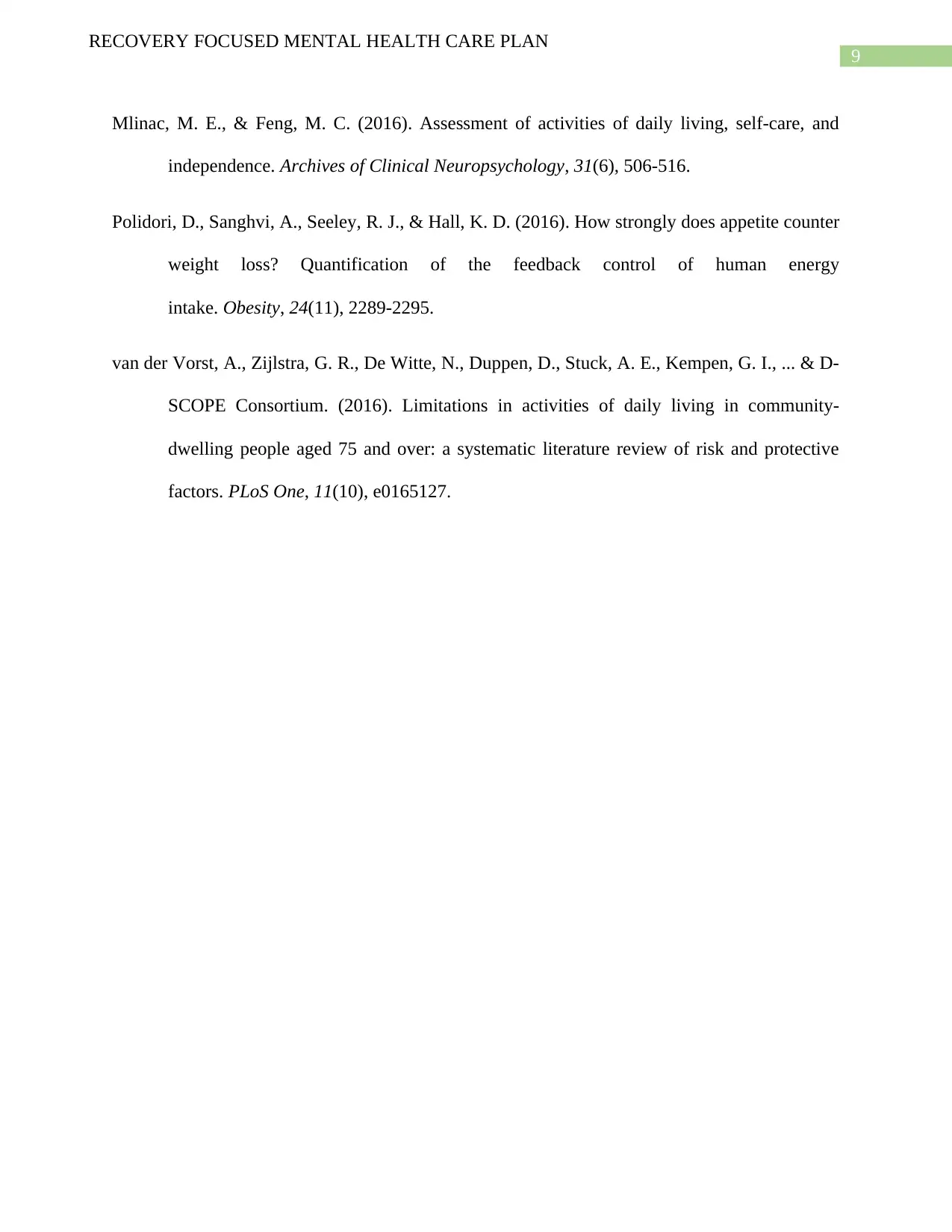
9
RECOVERY FOCUSED MENTAL HEALTH CARE PLAN
Mlinac, M. E., & Feng, M. C. (2016). Assessment of activities of daily living, self-care, and
independence. Archives of Clinical Neuropsychology, 31(6), 506-516.
Polidori, D., Sanghvi, A., Seeley, R. J., & Hall, K. D. (2016). How strongly does appetite counter
weight loss? Quantification of the feedback control of human energy
intake. Obesity, 24(11), 2289-2295.
van der Vorst, A., Zijlstra, G. R., De Witte, N., Duppen, D., Stuck, A. E., Kempen, G. I., ... & D-
SCOPE Consortium. (2016). Limitations in activities of daily living in community-
dwelling people aged 75 and over: a systematic literature review of risk and protective
factors. PLoS One, 11(10), e0165127.
RECOVERY FOCUSED MENTAL HEALTH CARE PLAN
Mlinac, M. E., & Feng, M. C. (2016). Assessment of activities of daily living, self-care, and
independence. Archives of Clinical Neuropsychology, 31(6), 506-516.
Polidori, D., Sanghvi, A., Seeley, R. J., & Hall, K. D. (2016). How strongly does appetite counter
weight loss? Quantification of the feedback control of human energy
intake. Obesity, 24(11), 2289-2295.
van der Vorst, A., Zijlstra, G. R., De Witte, N., Duppen, D., Stuck, A. E., Kempen, G. I., ... & D-
SCOPE Consortium. (2016). Limitations in activities of daily living in community-
dwelling people aged 75 and over: a systematic literature review of risk and protective
factors. PLoS One, 11(10), e0165127.
1 out of 10
Related Documents
Your All-in-One AI-Powered Toolkit for Academic Success.
+13062052269
info@desklib.com
Available 24*7 on WhatsApp / Email
![[object Object]](/_next/static/media/star-bottom.7253800d.svg)
Unlock your academic potential
Copyright © 2020–2026 A2Z Services. All Rights Reserved. Developed and managed by ZUCOL.





